August 15, 2025 -Youth Camp Day 1, Opening Ceremony, Dialogue Session
Hello. Starting today, the “Youth Camp with Venerable Pomnyun Sunim” will be held for three days at the Seonyudong Education and Training Center in Mungyeong.
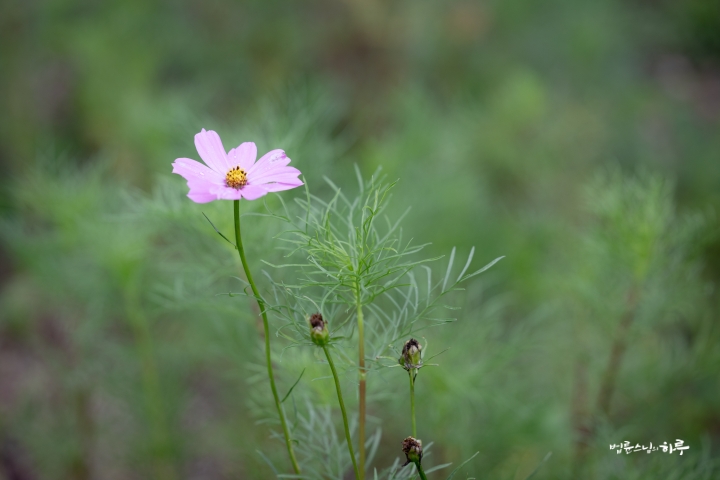
To attend the Youth Camp, Sunim completed his morning practice and meditation, then departed from Seoul Jungto Center at 6:50 AM heading to Mungyeong. As the Liberation Day holiday weekend began, cars poured onto the highway from early morning. He thought he could arrive in 2 hours, but heavy traffic made it difficult to arrive on time.
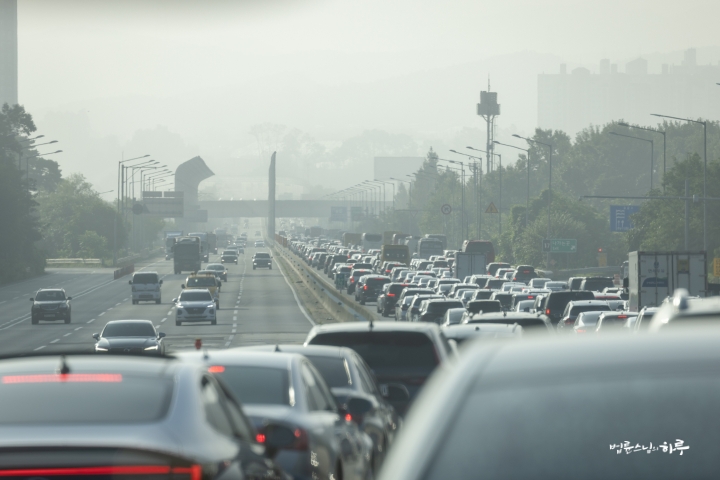
Avoiding congested sections by using local roads and driving continuously, he barely arrived at Seonyudong Education and Training Center at 10 AM, the scheduled start time.
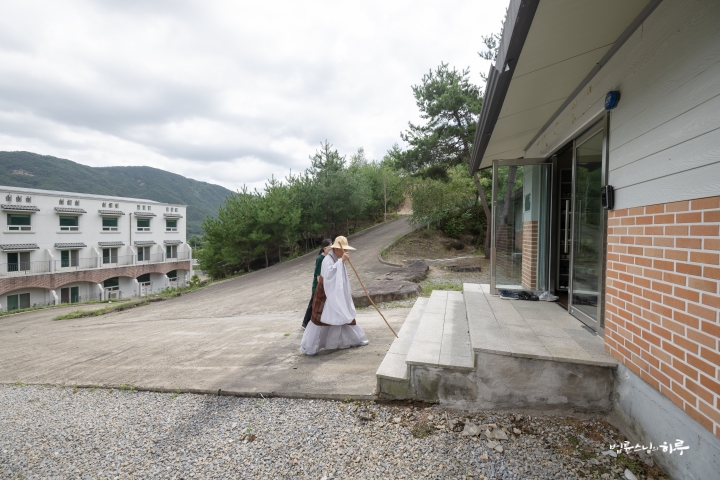
In the main hall, with about 50 volunteers from the Jungto Society Special Youth Division gathered, the opening ceremony for the Youth Camp began precisely at 10 AM.
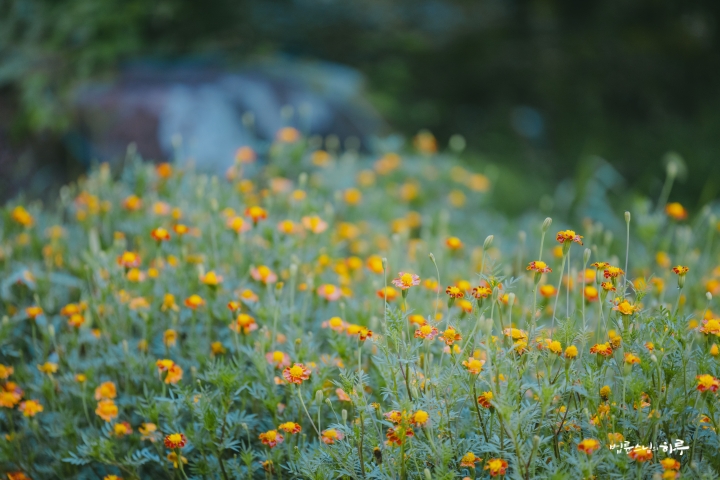
After reciting the Three Refuges and the Heart Sutra, participants from groups across the country introduced themselves. Starting with the Eastern Gyeonggi group, followed by Western Gyeonggi, Southern Gyeongsang, Northern Gyeongsang, Southern Seoul, Northern Seoul, and Chungcheong-Jeolla groups, each came forward in order to introduce themselves. Sunim sat quietly in the back, observing the young people’s introductions.
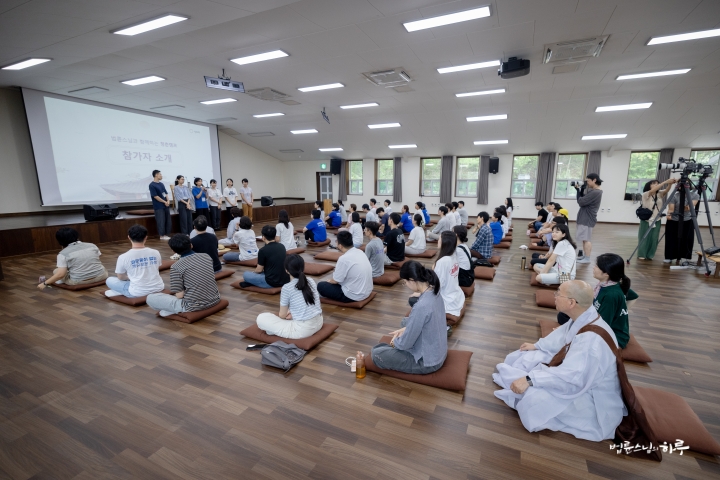
About 50 engaged volunteers from the Special Youth Division attended, including Jungto Dharma School facilitators, co-facilitators, group facilitators, and group leaders. Most were balancing their work life with Jungto Society activities, and they had traveled long distances with expectations of mapping out the direction for youth dharma propagation with Sunim over the next three days.
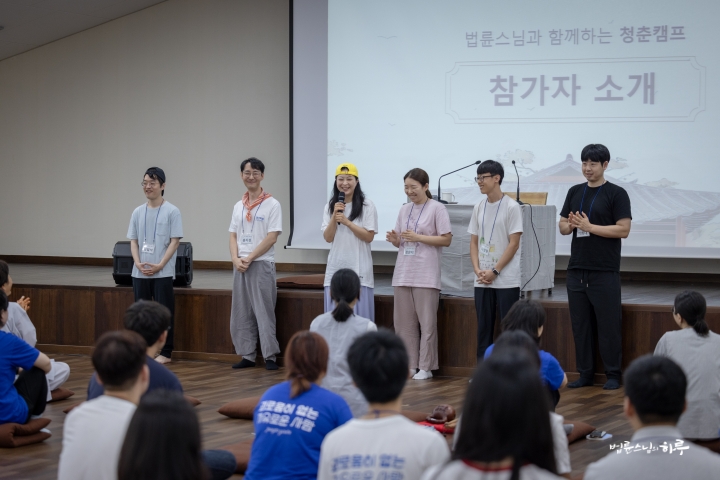
The youth volunteers then requested an opening dharma talk from Sunim with three prostrations. Sunim spoke about the significance of this Youth Camp and why they had gathered here.
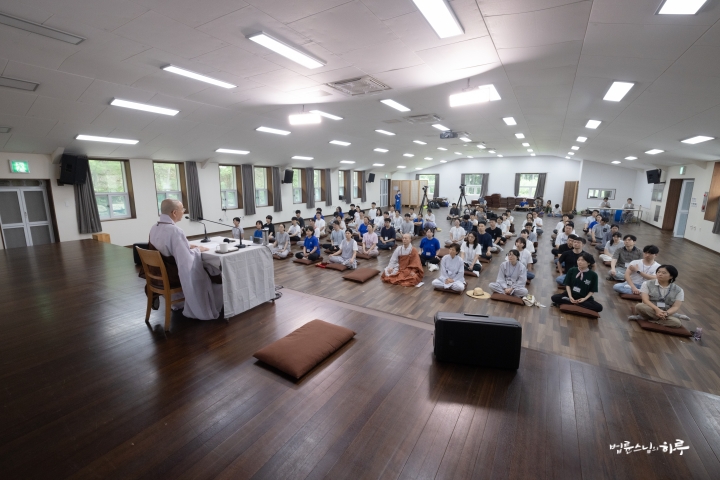
“There’s a saying that when young people thrive, the nation’s future is bright. Though you are now at the beginning of your careers, in just 20 or 30 years, young people will become important members of our society, playing pivotal roles in various fields. Among today’s youth will emerge future presidents, government ministers, and business leaders. To predict the future 30 years from now, we need to examine international relations, economic growth, and technological development. However, what matters most is how progressive and enterprising today’s young people in their 20s and 30s are. This is because the vigorous spirit of young people with healthy bodies and minds becomes the decisive factor in creating the future.
The Decisive Force That Changes the Future: The Vigorous Spirit of Youth
When I was in high school, I served as president of the Buddhist Student Association and organized the Buddhist Student Federation covering all of Gyeongsangnam-do and Gyeongsangbuk-do provinces. At that time, there were no senior students to guide and lead us. Occasionally, graduated seniors would visit, but they only tried to enforce discipline forcefully without providing much help. During vacations, we prepared for retreats, and students did everything themselves from finding venues to cooking meals and organizing events. Even the monks at temples were reluctant to lend us retreat facilities, viewing us more as noisy students than learners to be taught. Finding a retreat venue was our biggest challenge. Once we somehow secured a location, we had to prepare meals for every mealtime. We decided that each person would bring rice as an essential ingredient, and we gathered seasoning ingredients by going door to door in the neighborhood asking for small donations. Looking back now, I wonder how we managed to work so enthusiastically when we hadn’t even received proper Buddhist education. After Saturday morning classes ended, we held Buddhist Student Association dharma assemblies in the afternoon, sometimes gathering hundreds of participants. We were equally enthusiastic about promotional activities. Of course, in those days, not only Buddhist student associations but also church groups and organizations like YMCA were times when young students were actively engaged.
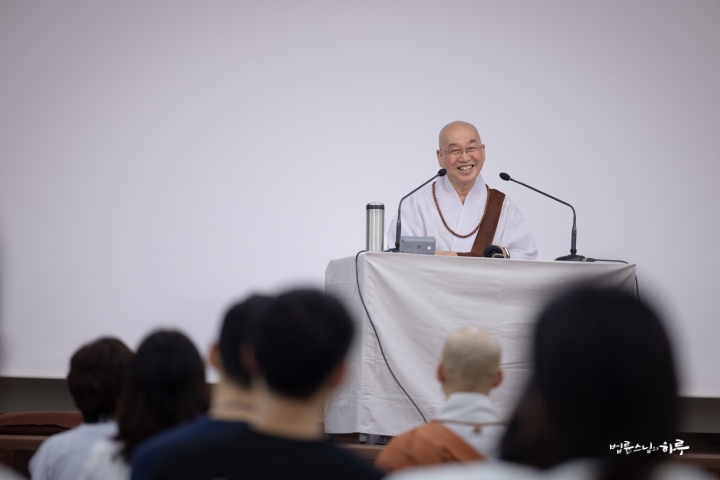
On the other hand, today’s middle and high school students have excellent physical growth, but they lack the autonomy to make their own decisions, making them appear childlike despite being teenagers. For humans to grow well, it’s important to learn various knowledge and eat nutritious food, but above all, it’s essential to have experiences of doing something on their own during adolescence. This is what creates the vigorous spirit of young people. Young people who attended university in the 1970s resisted the Yushin regime and were sometimes imprisoned. As economic development began, society emphasized efficiency, but the atmosphere was oppressive due to political suppression. However, even in such harsh circumstances, there was resistance from some young people. And entering the 1980s, young people everywhere fearlessly resisted unjust oppression. I was guiding university students at the time, and even in universities, rather than professors teaching students, students made all the decisions and created their own culture. As university students’ resistance grew, the initiative in schools shifted from professors to students.
But what about universities today? Administrative staff and professors make all the decisions, and university students just follow along. The atmosphere has changed significantly from the past. I’m not saying that you should actively engage in student movements when you go to university. What I want to say is that having spirit during youth is very important. The youth generation who participated in the democratization movement still has stronger spirit in their 60s than the current generation in their 20s. I’m neither trying to praise nor criticize their youth. I simply want to point out that because they had the spirit to resist unjust oppression in their youth, they lived earnestly without turning away from reality even after entering society. That is the spirit of youth.
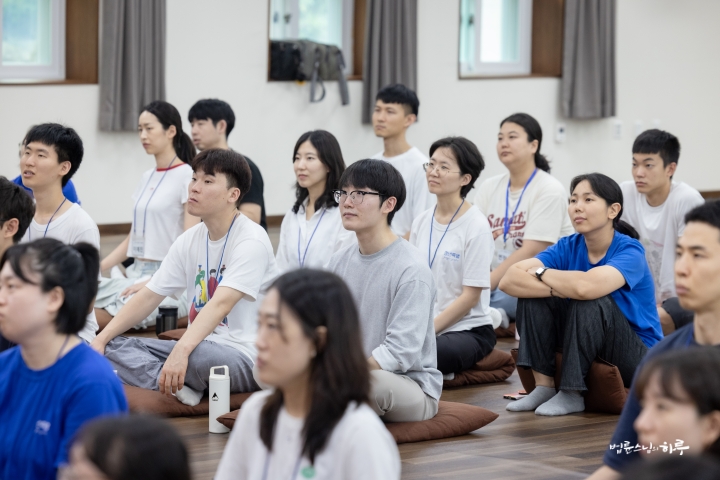
Young People Who Have Lost Their Independence Due to Parental Interference
The lack of initiative among today’s young people is a problem that appeared in Japan 20 years ago. In the past, parents of our generation often couldn’t attend elementary school or barely finished elementary school. Because of this, parents couldn’t help with decisions about middle school or high school, so students had no choice but to search for information themselves and ask their seniors for advice. However, nowadays parents are more educated than their children and have access to more information. This leads them to interfere, saying things like ‘This is how you should go to university’ or ‘This is how you should study abroad.’
The reason today’s young people are dependent is not because they are lazy or because of their innate temperament. It’s because they grew up in an environment where everything was explained to them one by one, like pets, and they never had the opportunity to make decisions on their own. As a result, even when they reach twenty or thirty years old, they cannot make decisions as the masters of their own lives. Of course, not everyone is like this. A small number who have shown talent in specific fields such as art, sports, broadcasting, or acting from a young age live more independently than in the past. However, the majority of young people have lost much of their drive and spirit. While they may have technical knowledge, their ability to make decisions independently has greatly diminished. I hope our young people won’t shrink back but will engage in activities with a vigorous spirit. I’m not saying they should become monks or Jungto Society members, but rather that they should have an independent spirit as young people.
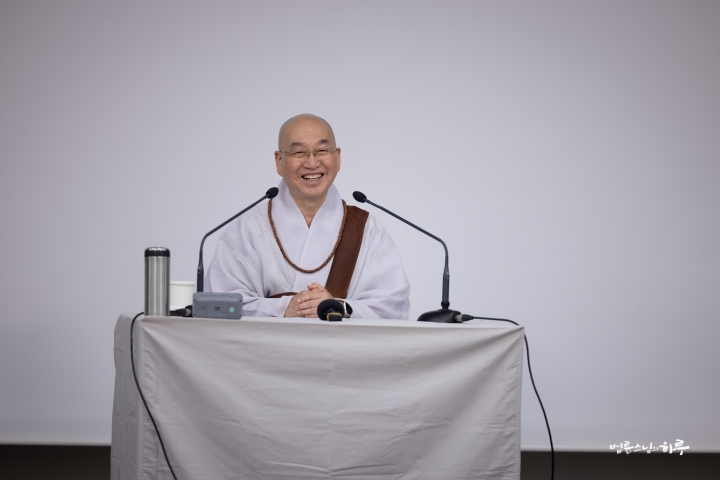
Youth Festa: A Festival to Dispel the Hesitation and Anxiety of the Young Generation
According to recent reports, 400,000 young people in our country are currently unemployed. So I thought we could do something to inject vitality and instill a positive spirit in young people. I think it would be good to hold a ‘Youth Festa’ and create an event that is both light and beneficial. Even if many people come, it leaves us wanting if there’s no substance. We don’t need to hold events that attract crowds but lack content. Professional event planning companies already do plenty of those. So I hope we can create an event that is somewhat light but also has meaningful content.
If you agree with this purpose, you need to plan the specifics yourselves. While ideas from Sunim or Dharma teachers are good, it’s really important for you young people to experience the process of thinking through and implementing this yourselves. Only by planning and executing it directly can you understand what the problems are and learn how to improve in the future.
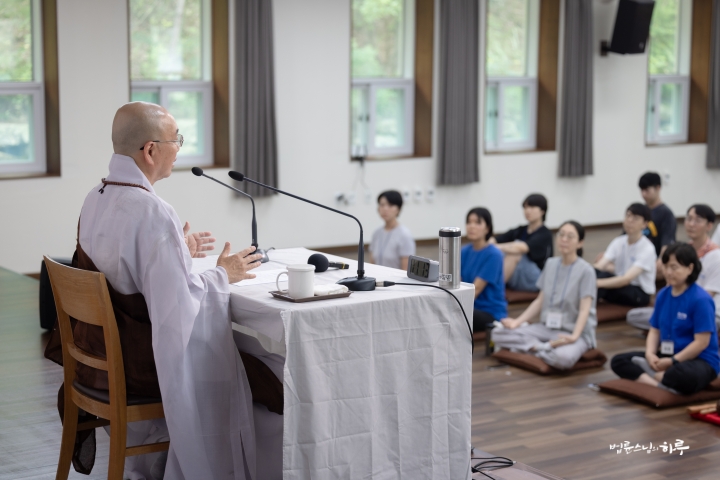
Whether something succeeds or fails isn’t what’s important. If something fails due to shortcomings, we can strengthen those weak areas, which means it’s not a failure but a success. We need to look at things from this perspective. Young people need opportunities to fail. I’m not saying to fail by doing things carelessly without any effort. If you fail despite giving your absolute best effort, you need an attitude that accepts it as part of the process. Through several failures, we can create better, newer plans.
In that spirit, I hope you’ll put your heads together and discuss over these two nights and three days. Through this process, you’ll gain the strength to move forward without fearing the world. These experiences will become the power that enables you to perform without shrinking back at work, in your job, or when studying. It’s also necessary for you to volunteer at Jungto Society using the technical experience you’ve gained in society. Conversely, you should apply the experience gained through Jungto Society activities back to academic research, companies, and workplaces, creating this mutually beneficial interaction.
It’s with this purpose in mind that the idea of holding a ‘Youth Festa’ emerged. Once we gain experience and know-how this time, we might be able to hold an ‘International Youth Festa’ with young people from not just Korea but also Japan, Vietnam, Thailand, India, and other Asian countries participating. While results and achievements are important, what’s more important is that through such events, young people can shake off the hesitation and anxiety in their hearts and gain the courage and spirit to move forward powerfully.”
The young people responded to Sunim’s words with enthusiastic applause.
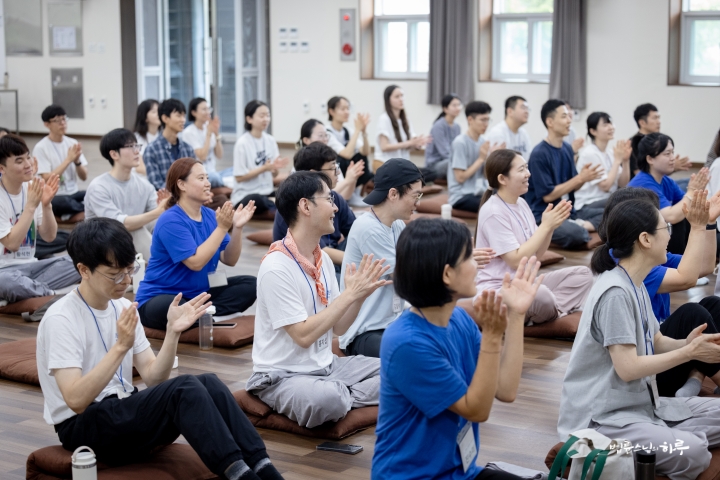
Everyone took out the lunch boxes they had prepared at home and had lunch. The atmosphere became even more intimate as they shared their food with each other.
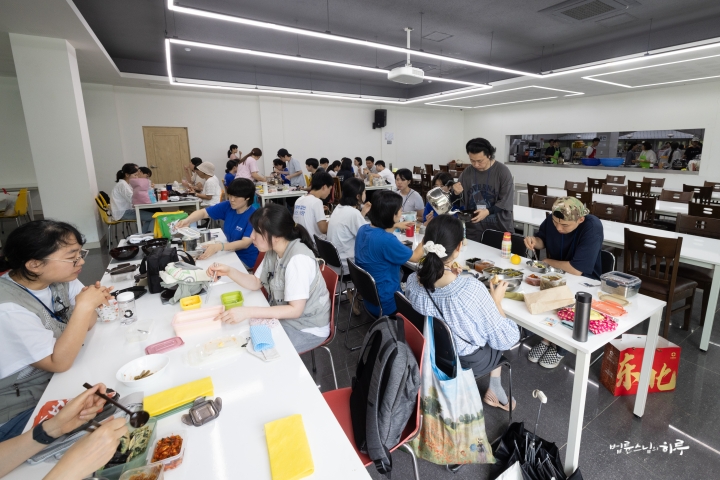
From 1 PM, participants engaged in group discussions on the theme of “Me and Jungto Society.” Before attending the camp, the young adults had studied Sunim’s book “Buddha the Revolutionary” and held discussion sessions. Following the preliminary discussions, today they shared their most challenging moments and insights gained while participating in Jungto Society activities.
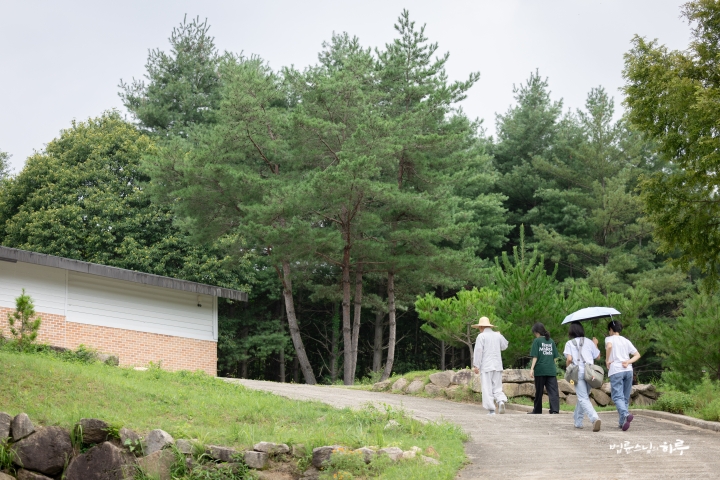
After the discussions, a Dharma Q&A session with Sunim began at 3 PM. The young adults freely asked questions about concerns arising from their activities as practitioners. During the two-hour session, eight people raised their hands and shared various concerns from their practice, environmental work, welfare activities, and peace efforts. One participant asked about Sunim’s experience regarding whether suffering gradually decreases through practice or completely disappears at a certain moment.
When Did You Feel Your Suffering Had Disappeared?
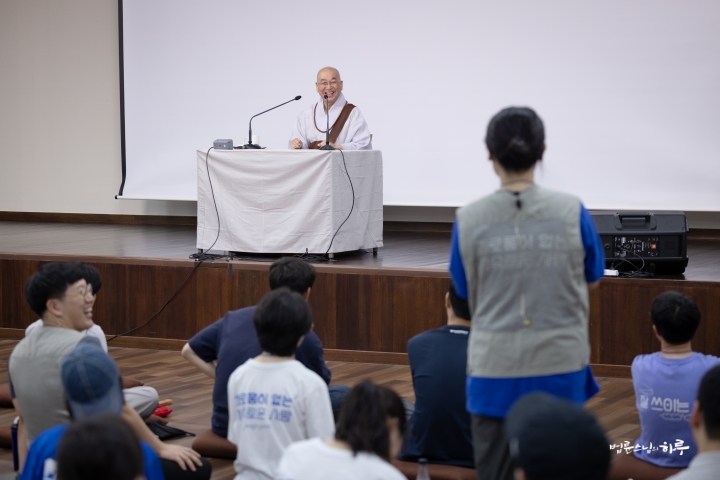
“I still have suffering even now. So it’s a bit difficult to answer what the catalyst was for suffering to completely disappear, as you asked.” (Laughter)
“I thought it might be somewhat of a secret.”
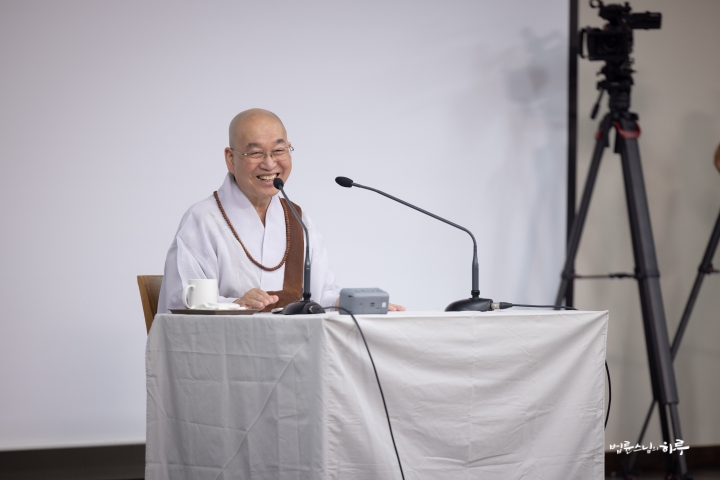
“Regarding certain issues, others may suffer while I don’t, and for other issues, suffering may arise in me but quickly disappear through awareness. Thinking that suffering can completely disappear from a certain moment comes from viewing life as static. For example, when you borrow money, you must repay it with interest. Ordinary people tend to borrow money when in need, but practitioners tend not to borrow. However, if there’s an absolute necessity to borrow, they don’t suffer about repaying because they naturally accept paying back with interest. Practitioners don’t create karmic connections, so they don’t receive karmic consequences. However, if they create connections out of necessity or unknowingly, they willingly accept the consequences. Others may think that person is suffering, but when you already expect difficulties, they’re no longer difficulties. If you expect praise but receive criticism, it’s painful. But if you know ‘doing this will inevitably bring some criticism’ and still proceed, receiving actual criticism doesn’t cause much suffering.
When awakening comes or major changes occur through certain catalysts, it’s usually during unfortunate events. You learn a lot when tortured or when making big mistakes. Small mistakes often go unnoticed, but making big mistakes can lead to realizing one’s true nature, and experiencing great pain can provide opportunities for change. However, there’s no need to deliberately create suffering. That would make you an ascetic. But disasters or pain that come to you aren’t avoidable. What matters is how you view them. When such pain or disasters strike, having a practice perspective can actually provide greater stimulus for growth. Looking at examples of wise teachers, many have completely transformed themselves through major mistakes or gained opportunities for self-reflection through great injustices.
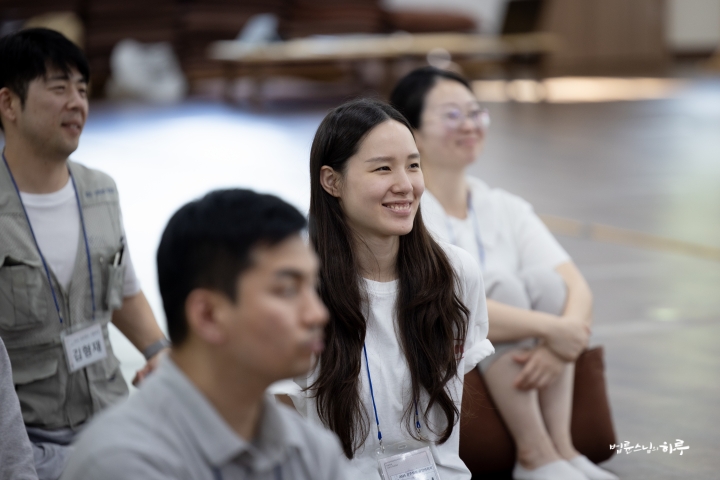
So you might think, ‘Should I deliberately seek out torture?’ or ‘Should I intentionally go to prison?’ But what I mean is that experiencing such situations isn’t necessarily only bad. When you endure great suffering, subjective time lengthens. Suffering for one year can have the effect of learning in a short time what you might learn over ten comfortable years. So while there’s no need to deliberately seek difficulties or suffering, there’s also no need to turn away from approaching challenges. With this perspective, fear diminishes when undertaking any task.
When you realize that even disasters can be blessings, everything in the world becomes a blessing. Ultimately, what’s important isn’t avoiding suffering, but realizing that there’s originally nothing to suffer about. It’s not about forcibly enduring and overcoming when there are things to suffer about, but understanding that there are just events in the world – the events themselves aren’t inherently causes for suffering. When you realize that suffering arises from the psychological side effects of things not going as you want, and you let go of this, you can be free from suffering.
So the most important thing is to realize that there’s originally nothing to suffer about. For example, when getting divorced, instead of thinking ‘How can I divorce without suffering?’, the practice is to realize that divorce itself isn’t inherently a cause for suffering. The same goes for being hospitalized or receiving a cancer diagnosis. They’re just events, not causes for suffering. They’re common occurrences in this world, but they become causes for suffering because I don’t want them. If I want something, it becomes good fortune; if I don’t want it, it becomes a disaster. Ultimately, when you let go of attachment to wanting and not wanting, all events in the world are just events in the world.”
“Yes, thank you.”
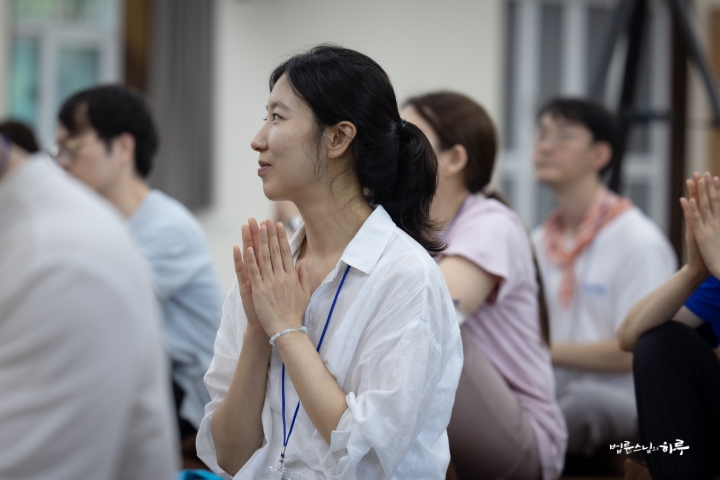
Questions continued one after another.
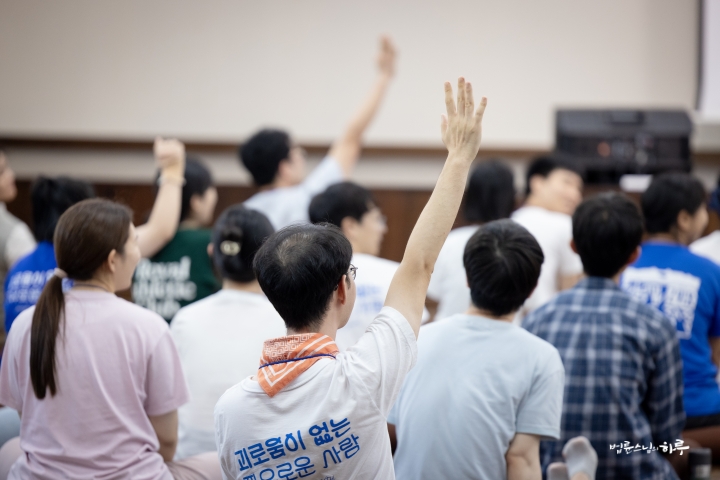
What kind of practice perspective is needed to be able to ‘acknowledge differences’ even with people who repeat extreme claims or baseless stories?
What mindset should I have to consistently continue environmental practices even when tired or busy?
I heard that Sunim initially helped Indian children, then stopped supporting them when he saw them becoming beggars, and eventually established a school. How did Sunim feel at that time?
When will the newly revised book be published, and are there plans for public communication events like book concerts after publication?
In Jungto Society’s decision-making structure, how can we maintain the spirit of the three-party system between lead volunteers who actually carry out projects and those with voting rights? What about the volunteer shortage problem as youth participation increases?
The Buddha pondered ‘Why must one die for another to live?’ – was this concern resolved when he realized the law of dependent origination?
From the perspective of seeing work and practice as one, I’m confused whether I should strive when working or be comfortable like in practice.
At 6 PM, the Dharma Q&A session concluded.
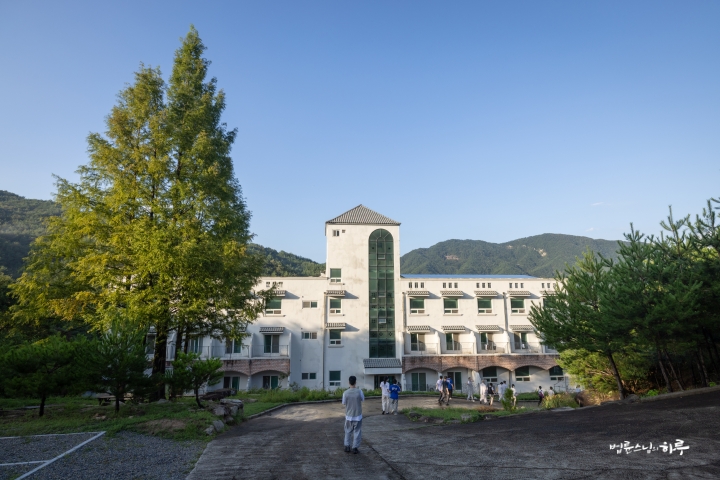
Dinner was served immediately. Rice, soup, and one side dish were prepared by volunteers from the Special Youth Division who came to provide support services for three days. Everyone enjoyed dinner with the rice and soup prepared by the support volunteers, along with side dishes brought from home.
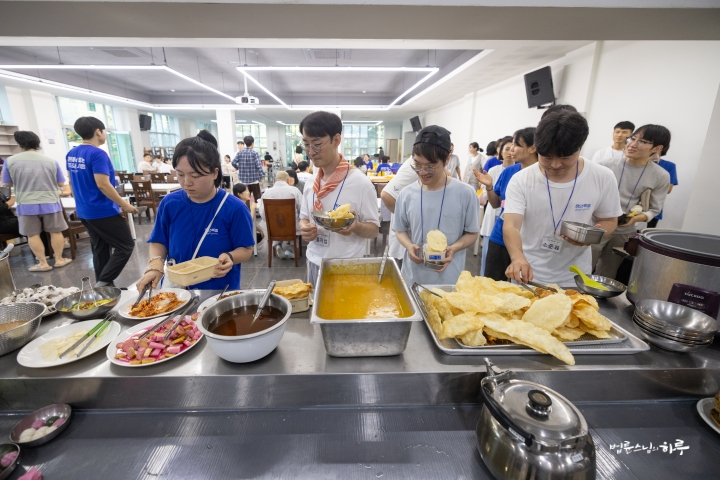
As the sun set, at 7 PM everyone gathered in the main hall for evening prayers together.
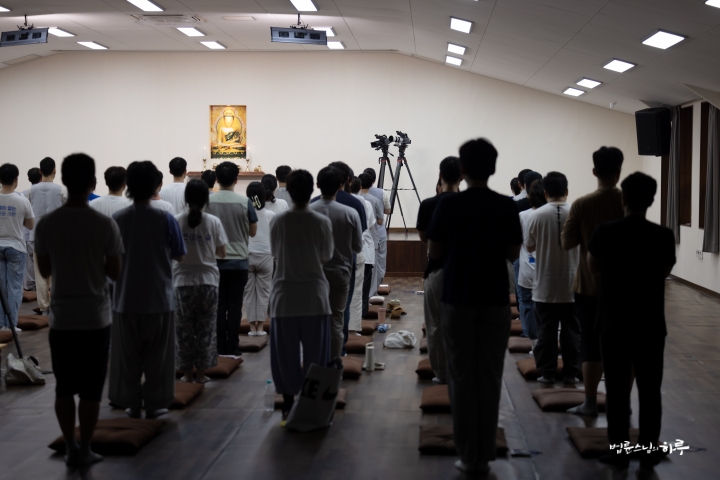
Before starting the evening dialogue session, they had time to sing together to help wake up. As they belted out lively songs, all the young volunteers stood up, linked arms, and sang along at the top of their lungs. The main hall instantly filled with vibrant energy.
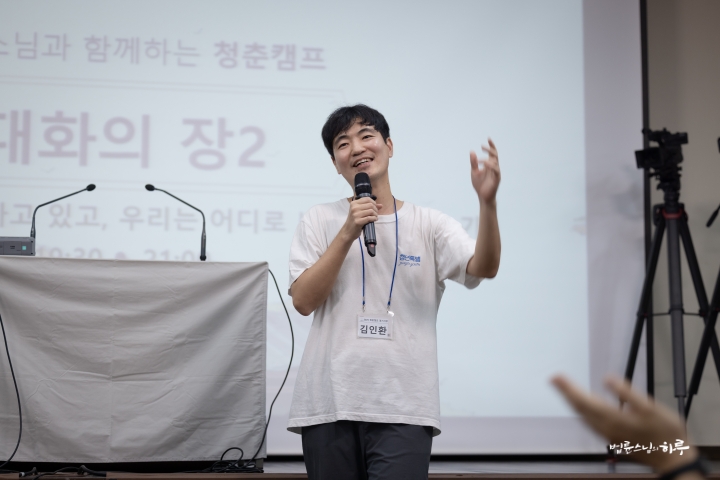
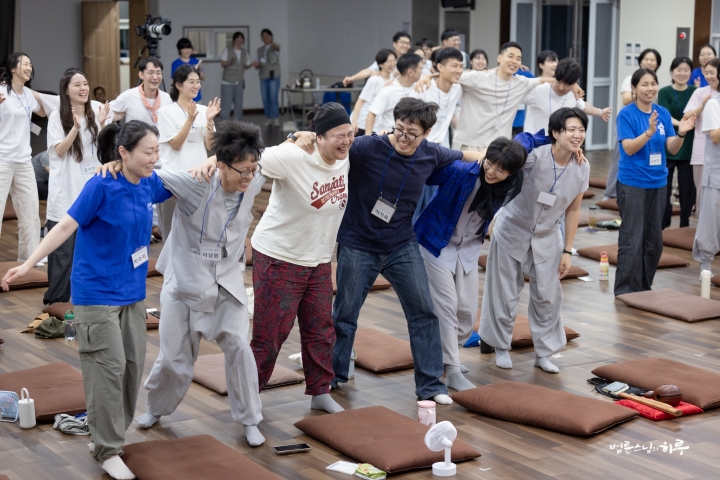
Leaving the heated atmosphere behind, they did meditation to calm their minds. Sunim then continued the dialogue. The topic for the evening dialogue was ‘Where is the world heading, and where should we go?’ Sunim talked about what vision young volunteers should have amid the climate crisis and rapidly changing international situation.
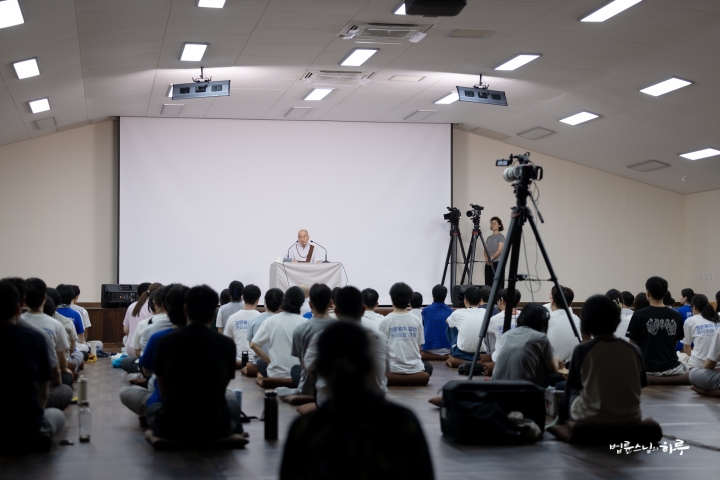
“Where is the world heading now? First, on a global scale, the climate crisis is worsening day by day. As a result, natural disasters such as heat waves, heavy rains, and wildfires are expected to occur more frequently.
Second, as the hegemonic competition between the United States and China intensifies, the entire world is likely to become more disorderly and chaotic. In the old days of U.S.-Soviet hegemonic competition, the world was divided into two camps and order was maintained to some extent within certain boundaries. However, now international law is becoming ineffective, and conflicts and wars are expanding in various parts of the world. At some point, the country that wins the hegemonic competition may establish a new international order, or without a clear winner, both may waste their national power, with China fragmenting and the United States declining, turning the entire world into a lawless zone. While it’s difficult to accurately predict the future at this point, we can see that conflicts are likely to intensify and international order is likely to become increasingly chaotic.
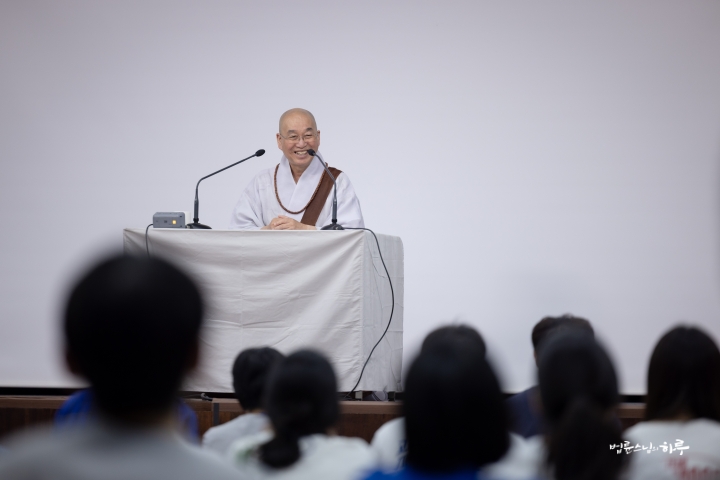
Climate Crisis and Hegemonic Competition: Where Is the World Heading?
In this situation, as scientific technologies such as artificial intelligence (AI) and robotics advance, the wealth gap is expected to widen dramatically not only between countries but also within each nation. This could intensify the suffering of those in extreme poverty who struggle to survive. In particular, as conflict zones increase, the number of refugees will explode, and when combined with climate refugees, the entire world will face even more serious refugee problems. These issues are likely to intensify gradually over 10, 30, or 50 years rather than occurring all at once. In any case, the era that young people will live through is likely to be far more chaotic than the present.
However, looking at history, we can see that chaotic periods are not necessarily entirely negative. During China’s Spring and Autumn and Warring States period, and in India during Buddha’s time, despite being turbulent eras of constant warfare, the collapse of existing ideologies and order led to creative thinking and experiments aimed at establishing new order. In this flow, many thinkers including Buddha emerged in India, and in China, numerous thinkers known as the Hundred Schools of Thought appeared. During this time in China, iron civilization developed at a very rapid pace, and the development of areas south of the Yangtze River led to significant advancement in civilization.
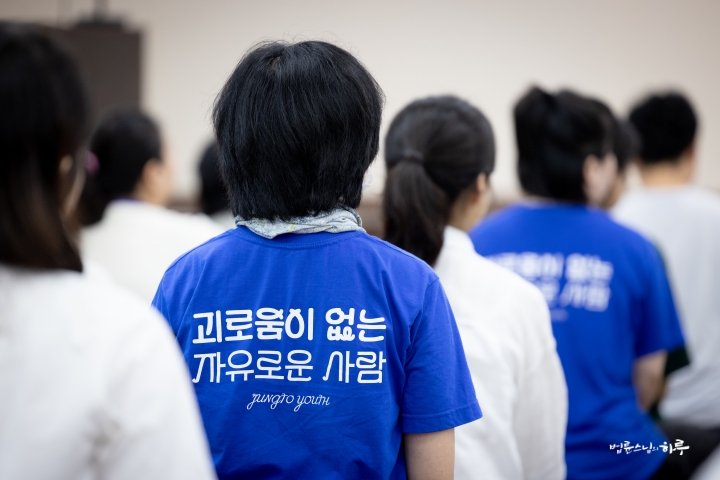
In Times of Chaos, the Small Courage of Youth Can Change the World
We can say that while such periods of chaos bring pain and despair, they also become the foundation for creative individuals to emerge and achieve new developments. Therefore, while it’s important to predict and prepare for the future, what’s most crucial is developing the self-reliance and adaptability to quickly understand and respond to any situation that arises. When times change rapidly, people living within them find it difficult to perceive the changes. This is because change doesn’t come suddenly overnight; rather, the past is maintained on one side while simultaneously collapsing on the other, with new things emerging. Today, we think that ‘lawyers and doctors are the best professions’ and ‘academic credentials are important,’ but contrary to our beliefs, this order is also collapsing at a rapid pace. This is similar to how the civil service examination system played a major role as a means of advancement until just before its abolition at the end of the Joseon Dynasty.
If we fail to recognize these changes and get caught up in the US-China hegemony competition, potentially leading to war between North and South Korea, we could suffer greatly. However, conversely, if the North and South cooperate appropriately, we could create opportunities to expand our influence in East Asia. Therefore, both individuals and nations need to prepare various scenarios in advance for whatever crises or opportunities may come. Rather than accepting these contemporary circumstances as factors that make our current lives and futures uncertain, it would be more desirable to view and prepare for them as windows of new challenges and opportunities.
Rather, in such chaotic times, there’s an advantage that we can stand out even with small achievements. It’s like how a small candle emits remarkably bright light in the dark night. Whether we’ll be swept into the whirlpool of hegemonic competition and collapse together, or become small candles giving hope to the entire world – this seems to be our challenge going forward.
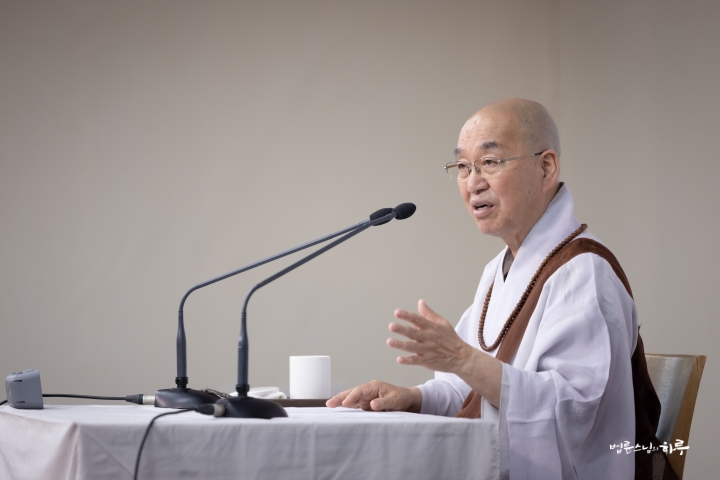
As practitioners, we must live without being greatly shaken by any situation that comes our way, taking life lightly with the attitude that ‘life is just one lifetime, whether it goes this way or that.’ And while we are alive, we must develop the strength to respond to any crisis and do work that can provide even a little help and hope to people in the world. No matter how chaotic the world becomes, it is important that we take pride in creating a new civilization and history. I believe such a life is far more rewarding than any other life.
The more chaotic society becomes, the greater people’s pain and suffering grow. Therefore, the Buddha’s right Dharma, which brings peace to people’s minds, can give hope to many. It is also important not only to bring peace to our own minds but to realize that we have the freedom of choice. We must adopt the perspective that we choose everything. If you take the perspective that you are the master of your own life and create a new civilization one step at a time, the work that Jungto Society is currently doing can be established as a new value system for young people. In other words, I have hope that the path to living happily while reducing consumption, the path to living peacefully without fighting with force, and the path to living meaningfully while helping those in need might become a small focal point for wandering youth. Creating this focal point doesn’t require a large number of people. I believe it’s something that can be sufficiently accomplished even with a group of your size.”
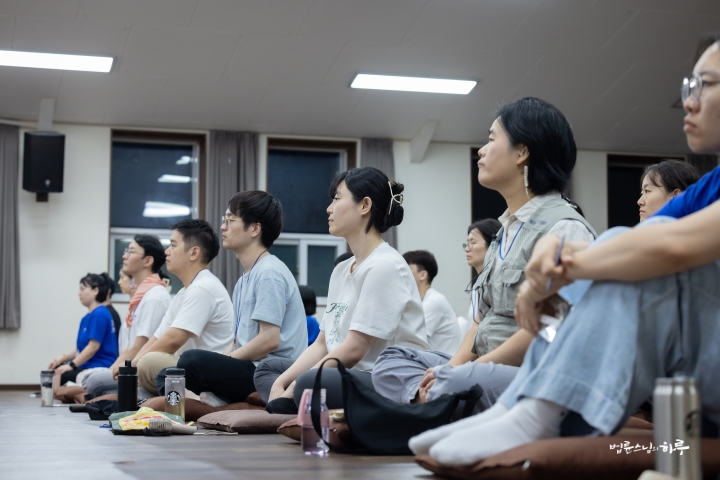
Next, Sunim took questions on the topic of social action. For an hour and a half, five people raised their hands and asked Sunim questions.
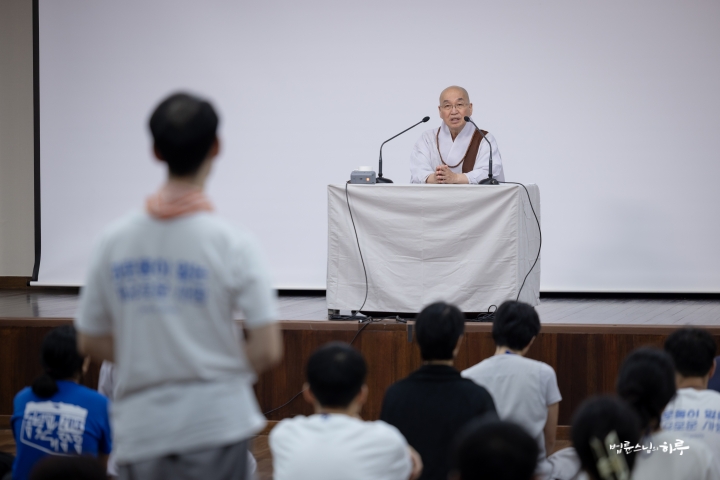
What opportunities do you think the development of Arctic routes and cooperation with Russia and North Korea could open for Korea’s future?
If the two Koreas declare an end to the war while maintaining a two-state system without unification, what would be the pros and cons, and what would be Korea’s desirable stance?
How should we view the global spread of far-right populism, and what perspective should we have when it intensifies?
Given the practical difficulties in Northeast Asian historical research and cooperation, what small actions can young people take, and why do you think structural problems in supporting historical research keep recurring?
In a future society where artificial intelligence advances, what perspective should we adopt in using AI to enhance individual happiness while reducing inequality?
After answering all the questions, it was past 9 PM. Although many more young people wanted to ask questions, the session concluded here, with plans to continue the dialogue tomorrow. This marked the end of the first day of the Youth Camp.
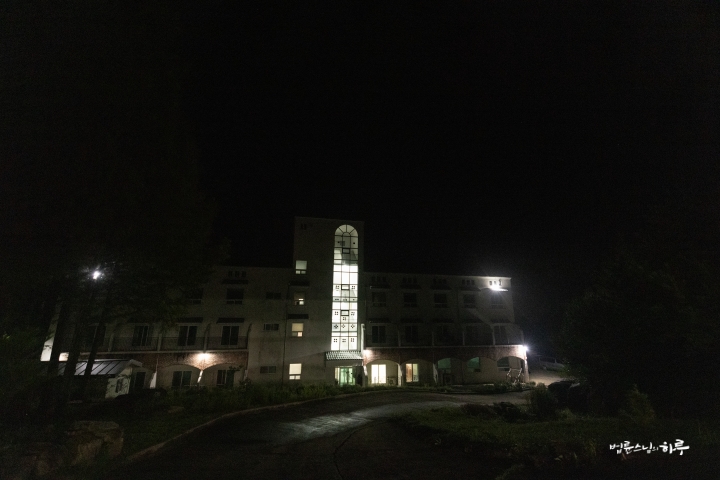
Tomorrow is the second day of the Youth Camp. In the morning, Sunim will attend the 49th-day memorial service for the late Venerable Myohyang at Mungyeong Jungto Retreat Center and give a Dharma talk for the repose of the deceased’s soul. In the afternoon, he will participate in the Youth Camp for an in-depth discussion with young volunteers about how to prepare for the “Youth Festa.”




